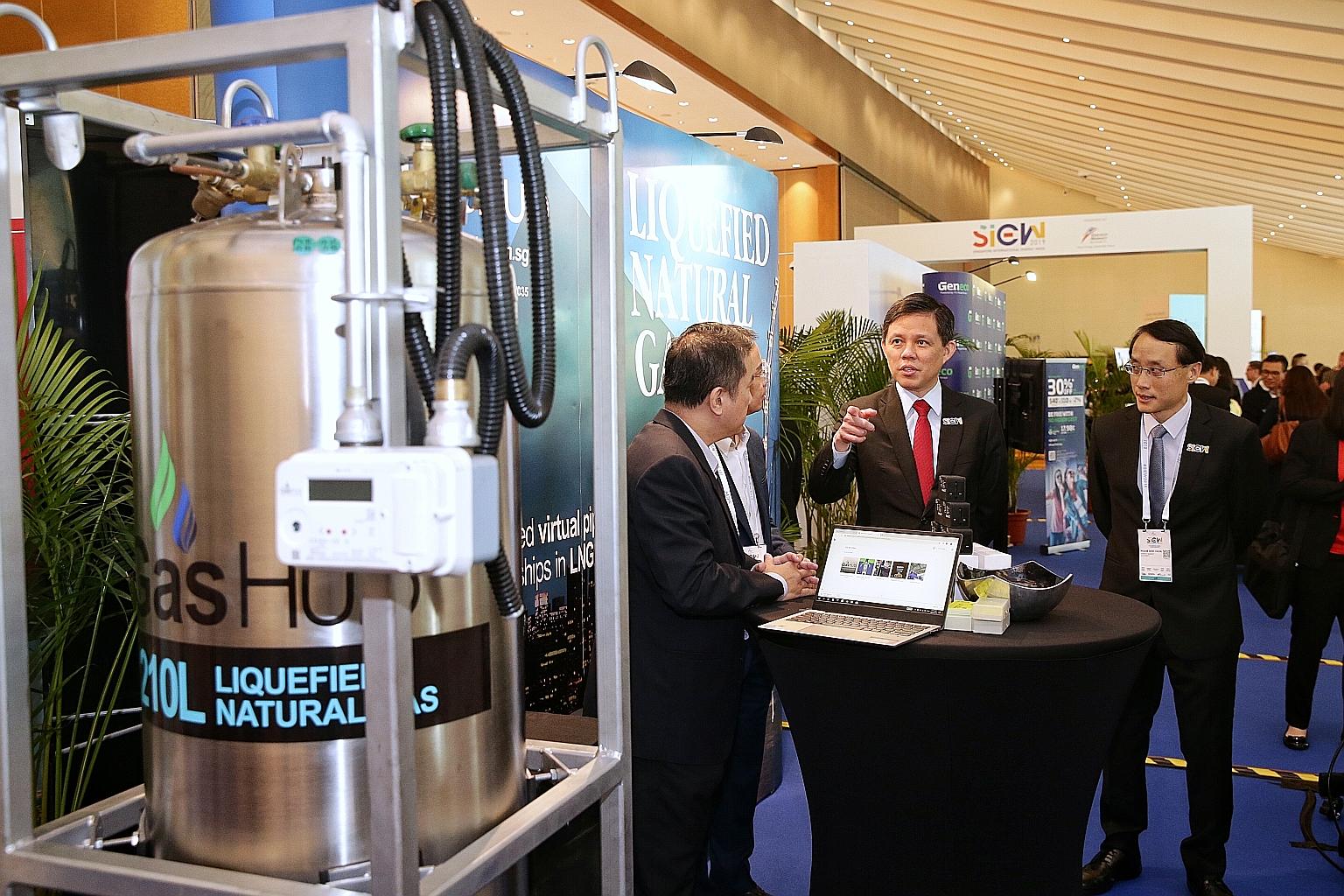Natural gas to remain Singapore's key energy fuel for 50 years
Republic has limited access to renewable options, says Chan; solar has its challenges
Sign up now: Get ST's newsletters delivered to your inbox

Minister for Trade and Industry Chan Chun Sing at a booth showing the model of a canister used for rebottling liquefied natural gas on Jurong Island yesterday. The model was on display at the Sands Expo and Convention Centre for the Singapore International Energy Week, which ends on Friday.
ST PHOTO: KEVIN LIM
Follow topic:
Natural gas, the cleanest form of fossil fuel, would still be Singapore's dominant fuel for its energy needs in the near future, even as the nation ramps up its solar output, Minister for Trade and Industry Chan Chun Sing said yesterday.
This is because the city state has limited access to renewable energy options such as geothermal or wind power, he said at the opening session of Singapore International Energy Week.
There are also challenges in harnessing solar power - the most viable renewable energy option for the country. These include Singapore's small size, the intermittency of sunshine due to cloud cover and urban shading, and the cost of solar deployment.
Said Mr Chan: "We will continue to rely on natural gas for the next 50 years for a substantial part of our energy needs."
Natural gas and solar energy are two of the four "switches" that Singapore will depend on for its energy needs, Mr Chan said. It will also explore a regional power grid and low-carbon alternatives.
More than 95 per cent of Singapore's energy now comes from natural gas - after the country started moving away from oil in the early 2000s.
Natural gas is the cleanest fossil fuel, while coal is the dirtiest.
It emits 50 per cent to 60 per cent less carbon dioxide when burned in a new, efficient natural gas power plant, compared with emissions from a typical new coal plant, according to the United States Union of Concerned Scientists.
But if natural gas, which largely comprises methane, leaks before it is burned, there could be repercussions on the global climate. This is because methane is a more potent greenhouse gas than carbon dioxide.
The latest assessment report by the Intergovernmental Panel on Climate Change considers methane as being 28 times more efficient than carbon dioxide at trapping heat on the planet over a 100-year period.
Methane contributed to just 0.39 per cent of Singapore's emissions in 2014, said a report that Singapore submitted to the United Nations Framework Convention on Climate Change last December.
The authorities are taking measures to reduce the chance of such leaks and to boost the reliability of the gas network.
The Energy Market Authority (EMA) said conventional leak detection methods require intensive human involvement and rely heavily on customer reports of gas service problems, instead of direct detection. EMA had previously funded a project to identify and detect anomalies in the gas pipeline network via a system involving a variety of sensors and a computer algorithm.
Vigti is a spin-off from the project which was successfully completed early this year, and there are plans to scale this up further, said EMA.
Separately, in response to queries on Singapore's only coal-fired plant on Jurong Island, an EMA spokesman said the use of coal in Singapore is carefully managed.
The facilities on Jurong Island use a variety of fuel, she said, and the Tuas Tembusu Multi-Utilities Complex was set up to provide utilities such as steam and electricity to chemical companies on the island.
The EMA spokesman added that the amount of greenhouse gas emissions from the complex is similar to that from existing fuel oil plants in Singapore's system today, as the complex uses "a mix of clean coal and biomass to produce steam and electricity".
Asked on future plans for the coal plant, she said Singapore would continue to improve the technology or retrofit certain parts of gas-fired plants to improve efficiency and produce much cleaner energy.
SEE BUSINESS

